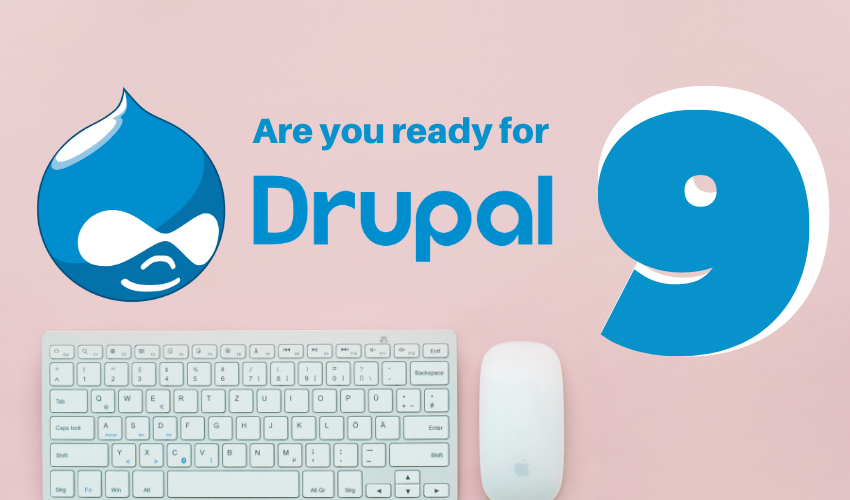
Drupal 9: Everything You Need To Know
Brace yourself, Drupal 9 is about to arrive. Launching next year, the new version of Drupal is built on Drupal 8 using deprecations and optional updated dependency support.
As with other new innovations, this upcoming release of Drupal 9 is already creating a lot of buzz. However, what does its strategic release mean for us? Let’s breakdown everything you need to know about Drupal 9 including its release date, key questions about Drupal 7 and 8, updating to Drupal 8 and 9, the impacts, and the preparation:
The Release Date
Drupal 8’s innovative model has accumulated new features and improvement during its new releases every six months. Drupal 9, however, will have to deprecate the codes first to ensure backward compatibility with the previous Drupal 8 releases. The deprecation process will remove the codes and anything that is no longer necessary.
Since Drupal have used third-party libraries such as Symfony, Twig, and Guzzle, these dependencies get outdated and unsupported. As a result, Drupal needs to update to newer versions and adhere to vendor support life cycles. If the updated dependencies impact backwards compatibility, these third-party libraries can only be added to Drupal in a new major release.
So to give Drupal 8 users enough time to update, prepare and plan, the Drupal community has decided to set the release date on June 03, 2020.
What Will Happen to Drupal 7?
The community support for Drupal 7 will still be supported until November 2021, which means it still has 1.5 years after the releasing of Drupal 9. After November 2021, Drupal 7 will no longer get support; the community at large will no longer create new projects, fix bugs in existing projects, write documentation, etc.
If your site is still running on Drupal 7, you should have already planned for a Drupal 8 upgrade and reap its awesome benefits instead of waiting for the end-of-life date.
However, if you plan on keeping Drupal 7, you can still use the services from specific third-party vendors recognised by Drupal 7 Vendor Extended Support program.
What Will Happen to Drupal 8?
Drupal 8 uses Symfony 3 which will expire on November 2021. Consequently, Drupal 8 support will also end on the same date. Alongside the release of Drupal 9, a long-term –support (LTS) minor release of Drupal 8 will also be released and will be supported until November 2021.
Upgrading from Drupal 8 to Drupal 9
The migration from one to the other will be seamless since Drupal 9’s core and functionalities are added to Drupal 8 as backward-compatible codes. As the new features of Drupal 9 become stable and successful, its older counterparts become deprecated. Therefore, the new Drupal release will only the stable features while the deprecated codes will be stripped away.
To update to Drupal 9, you’ll have to run update.php while making sure your codebase does not use deprecated APIs. Luckily, there are tools you can use to identify these deprecated APIs in your codebase.
How Drupal 9 Will Affect Your Work?
- For Core Contributors
You will have a limited set of tasks in Drupal 9 even before its official release. The new features will remove deprecated functionality and upgrade Drupal’s dependencies, making the release quality more robust and timing more predictable.
- For Contributed Module Authors
With the new technology at hand, you can already work on Drupal 9 early on and start updating your media modules. Drupal 8 will still be relevant in Drupal 9 so there will be no surprising change with how you will use the new version.
- For Drupal Site Owners
Drupal 9 is in many aspects like Drupal 8 with deprecations removed. Thus, upgrading to it will be so much easier compared to upgrading to Drupal 8. The only change you need to look forward to is the dependency updates and if your themes and modules are updated, the upgrade shouldn’t be complicated at all.
How To Prepare for Drupal 9?
The very important consideration for this migration is to ensure you no longer use deprecated codes. Here’s a simple guide for you to prepare for its arrival:
- Update your Drupal 8 features and modules.
- Try using Drupal Check for creating deprecation report.
- Check for deprecated codes at api.drupal.org.
- Generate a readiness assessment to address possible consolidated list of errors and necessary upgrade details for Drupal 9.
- Use the updated versions of dependencies.
Final Thoughts
Drupal 9 sounds like a big deal but it really shouldn’t be if you have planned ahead for the transition. If you have already upgraded to Drupal 8 and kept your websites up-to-date then you are well prepared for the launch of Drupal 9. If your business needs support or advice regarding the transition from Drupal 7 or 8 to Drupal 9 - lets talk.
The digital future is now, so don’t get left behind.
Contact Elephant in the Boardroom to make sure your website is up-to-date with the latest innovations in website technology.



